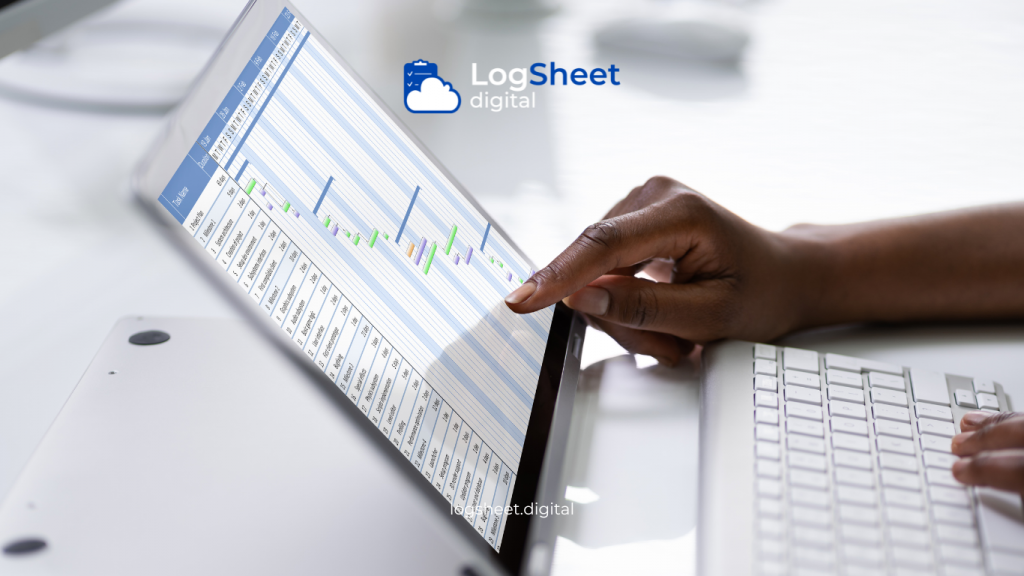Industri 4.0 has brought a revolution in the way manufacturing operates, focusing on automation, big data, and more sophisticated connectivity. One of the key components in this era is the use of digital logsheets to support operational activities. The integration of digital logsheets allows for increased efficiency, accuracy, and security in every process within the manufacturing environment. This article will discuss how Digital Logsheets Integrate into Smart Manufacturing, as well as the benefits and challenges of its implementation.
Industri 4.0, or often referred to as the fourth industrial revolution, is an era where digital technology, automation, and the Internet of Things (IoT) transform the way production and manufacturing operations are carried out. In this context, smart manufacturing becomes a primary goal for many companies. The application of digital technologies, such as digital logsheets, supports achieving high efficiency, better data management, and data-driven decision-making.
What is a Digital Logsheets?

Read More: Digital Logsheets: Logistics Service Development and Competitive Advantage Enhancement
A digital logsheets is a technology-based platform that replaces manual logsheets. It is used to record daily activities such as production monitoring, equipment inspections, stock management, and asset maintenance. This system automates the process of recording and analyzing data, providing better visibility and enabling faster and more accurate decision-making.
Benefits of Digital Logsheets
Digital logsheets have several advantages compared to manual recording systems, including:
- Higher Data Accuracy
Digital entry immediately validates data, which reduces the human errors that often occur with manual recording. - Real-Time Access
The entire operational team can access information directly without needing to send physical documents, which facilitates collaboration and oversight. - Time and Cost Savings
By eliminating the need for manual data entry, time and costs can be saved. This faster process also minimizes operational downtime. - Enhanced Compliance
Digital logsheets automatically store data, making audits easier and ensuring compliance with industry regulations or internal company standards.
Integration of Digital Logsheets in Smart Manufacturing

Read More: Implementing Digital Logsheets in Safety Inspections
The application of digital logsheets in smart manufacturing aligns with the principles of Industri 4.0, namely high connectivity between devices and systems. Here are some ways digital logsheets integrate into smart manufacturing:
- Real-Time Production Monitoring
With digital logsheets, production managers can monitor the production process in real-time and receive notifications when anomalies occur. This data can help in making quick and accurate decisions. - Preventive Maintenance
Digital logsheets enable continuous monitoring of equipment conditions. If performance degradation occurs, the system provides early warnings, allowing you to perform maintenance before a failure happens. - Data Analysis for Optimization
Analyzing data collected through digital logsheets helps identify patterns that optimize the production process In this way, companies can pinpoint areas needing improvement and enhance efficiency. - Integration with IoT
Digital logsheets can directly connect with IoT devices in the field. For example, IoT sensors can automatically send data into the digital logsheets system, minimizing human intervention and increasing accuracy.
Challenges in Implementing Digital Logsheets

Read More: Data Security in Digital Logsheets: Challenges and Solutions
Despite the many benefits of digital logsheets, companies must address several challenges when integrating this technology into smart manufacturing environments:
- Implementation Costs
The initial investment for software, hardware, and employee training can be a barrier for some companies, especially small and medium-sized enterprises. - Work Culture Change
Transitioning from manual to digital systems requires a change in work culture. Employees need to be trained and guided to adopt new technology, which may take time. - Data Security
With a lot of data connected through networks, security becomes a major concern. Companies must ensure that the digital logsheets system used has strong security protocols to protect sensitive information from cyber threats.
Case Study: Digital Logsheets Implementation in the Automotive Industry

Read More: Digital Logsheets as a Warehouse and Logistics Operations Monitoring Tool
As a successful example of digital logsheets application, the automotive industry has adopted this technology to improve production quality and equipment monitoring. One major automotive company uses digital logsheets to monitor assembly activities, from recording operator work hours to machine maintenance.
With digital logsheets, the company successfully reduced downtime caused by equipment failures by 20%. Managers can now access daily reports instantly and in real-time, whereas processing them previously took several hours, providing greater visibility for production line managers.
The Future of Digital Logsheets in Manufacturing

Read More: Optimal Quality: Digital Logsheets & Raw Materials
Given the current technological developments, digital logsheets are expected to continue evolving and play a larger role in manufacturing industries. In the coming years, digital logsheets may increasingly integrate with artificial intelligence (AI) and machine learning, enabling automatic data analysis and providing more accurate predictions related to equipment conditions and maintenance needs.
Moreover, the increased use of IoT devices in smart factories will accelerate data collection and analysis processes, making digital logsheets a crucial element in more effective and efficient operational management.
Conclusion

Read More: Data Security in Digital Logsheets: Challenges and Security Strategies
The integration of digital logsheets in the era of smart manufacturing is an important step towards creating a more efficient and sustainable industry. With benefits such as improved data accuracy, real-time access, time savings, and better compliance, digital logsheets play a crucial role in driving companies towards Industri 4.0. However, challenges such as implementation costs and data security must be addressed to ensure the successful integration of this technology.
The future of manufacturing will increasingly rely on digital technologies like digital logsheets to optimize operations and enhance competitiveness in the global market. By continuously innovating and adopting this technology, the industry will be able to respond more rapidly to market changes and ensure long-term operational sustainability.






leave your comments